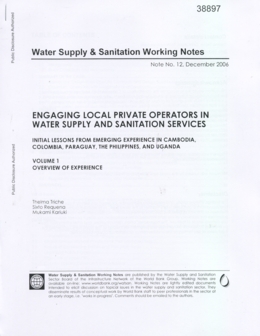 Between 1994 and 2004, the World Bank approved funding for WSS projects that supported local private sector participation (PSP) in the development or operations (or both) of water supply (and, in a few cases, sewerage) services in small and medium-size towns in a number of countries in Africa, Latin America, and Esat Asia. This study documents the experience to date of such projects in five countries: Cambodia, Colombia, Paraguay, the Philippines, and Uganda. This report summarizes information on the contracts and the selection process, extracts lessons learned to date from the cases, and recommends follow up activities to address some key issues and fill gaps that were identified in the course of the study. Table of Contents: List of Acronyms 1. Introduction
1.1 Background
1.2 Study Objectives and Methodology 2. Summary of the Cases
2.1 Cambodia: Design-Build-Operate Contracts and Design-Build-Lease Contracts
2.2 Colombia: Operation with Investment and Construction-Operation Contracts
2.3 Paraguay: Build-Operate Contracts
2.4 The Philippines: Design-Build-Lease Contracts and Operation and Maintenance Contracts
2.5 Uganda: Short-Term O&M “Management” Contracts 3. Findings
3.1 Overview of the Contracts, Local Private Operators, and Contracting Parties
3.2 The Political Economy and the Development of the Upstream Policy Framework
3.3 Contract Form and Content
3.4 The Selection Process
3.5 Training, Consultation, and Promotional Activities
3.6 Financial Arrangements and Risk Mitigation Instruments
3.7 Monitoring and Regulatory Arrangements 4. Lessons Learned
4.1 The Political Economy and the Development of the Upstream Policy Framework
4.2 Design of the Contractual Arrangements and the Selection Process
4.3 Training, Consultation, and Promotional Activities
4.4 Financial Arrangements and Risk Mitigation Instruments
4.5 Regulatory Framework, Capacity, and Mechanisms 5. References
Post Date : 05 Juni 2009
| 